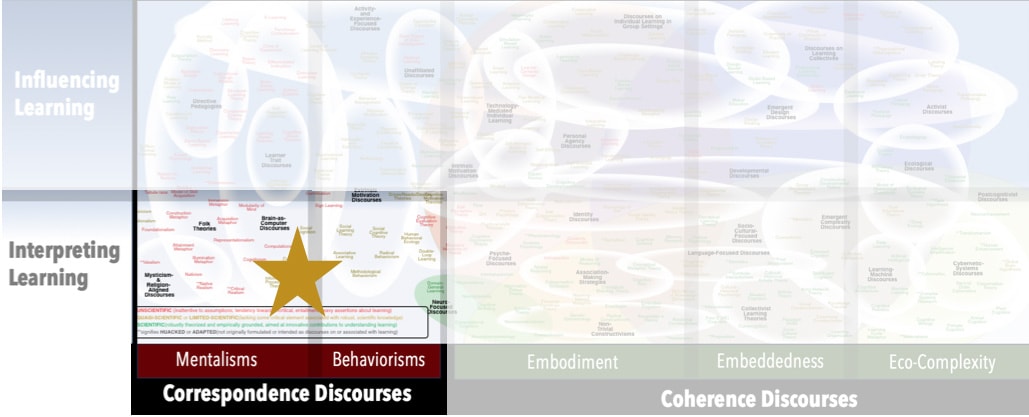Focus
Reciprocally determined learning prompted by observation and imitationPrincipal Metaphors
- Knowledge is … scope of possible actions and interpretations
- Knowing … the range of one’s behaviors and thoughts
- Learner is … an actor
- Learning as … changing behaviors and extracting information from contexts
- Teaching as … modeling
Originated
1970sSynopsis
Social Learning Theory arose partially in response to perceived limitations of Behaviorisms. It describes learning as a continuous, reciprocal interaction of behavioral and cognitive processes within a social settings. Social Learning Theory further challenges Behaviorisms’ narrow focus on behaviors associated with rewards, providing evidence that observing a behavior is sufficient, and rewards can be vicarious (i.e., received by others, but still motivating to the observer). Consequently, learning is described as extracting information (reminiscent of Cognitivism) and/or changes in behavior (reminiscent of Behaviorisms), thus attending to both mental and physical activity. In turn, teaching is construed in terms of modeling:- Behavior Modeling – a teaching aspect of Social Learning Theory , whereby a knowing agent manifests a significant behavior for the learner to observe, analyze, and imitate
- Cognitive Modeling (Dale Schunk, 1980s) – a deliberate demonstration of how to think about something (Note: should not be confused with the theory of Cognitive Modeling.)
- Appraisal Theories of Emotion (Emotion Theory) (Albert Bandura, 1970s) – based on the recognition that emotions significantly influence receptivity and retention, Appraisal Theories of Emotion are concerned with predicting and managing learners’ emotional states in ways to enhance learning
- Cognitive–Motivational–Relational Theory (Richard Lazarus, 1970s) – an elaboration of Cognitive Appraisal Theory (see below) that comprises three processes: the appraisal (Cognitive), influence of one’s intentions (Motivational), and situational influences (Relational)
- Cognitive Appraisal Theory (Richard Lazarus, 1960s) – a discourse concerned with one’s interpretations and responses to life stresses in which it is asserted that “cognitive appraisal” (i.e., subjective evaluation) is involved in every emotion. Appraisals are suggested to be based on the three components: Goal Relevance, Ego Involvement, and Coping Potential.
- Social-Cognitive Theory (Cognitive-Social Learning Theory) (Albert Bandura, 1980s) – an extension of Social Learning Theory that emphasizes the need to feel agency and to exert control over events in one’s life
Commentary
Because it doesn’t engage directly with the question “What is learning?” – but, rather, focused on perceived gaps of Behaviorisms – Social Learning Theory retains many of the limiting and untenable assumptions of most Correspondence Discourses. For instance, even while prompting attentions to mental processes and to reciprocal determination of actors, it assumes mind/body and self/other dichotomies that interact mechanically. More significantly, Social Learning Theory does not pay much attention to its metaphors of learning and thus retains indefensible baggage from Acquisition Metaphor and other Folk Theories.Authors and/or Prominent Influences
Albert BanduraStatus as a Theory of Learning
Social Learning Theory is a theory of learning.Status as a Theory of Teaching
Social Learning Theory is not a theory of teaching, but its support for the notion of “teaching as modeling” had a significant influence in formal education. Prompting attentions to teachers’ responsibilities to manifest behaviors and sensibilities was an important reminder of the very narrow and controlling conceptions of teaching supported by Behaviorisms (i.e., teaching as conditioning).Status as a Scientific Theory
Social Learning Theory is not explicit about what learning is, and it uncritically maintains assumptions and descriptions offered by other perspectives (including Folk Theories). It is supported by some empirical evidence, most of which is rooted in sensibilities and methods from Behaviorisms.Subdiscourses:
- Appraisal Theories of Emotion (Emotion Theory)
- Behavior Modeling
- Cognitive Appraisal Theory
- Cognitive Modeling
- Cognitive–Motivational–Relational Theory
- Social-Cognitive Theory (Cognitive-Social Learning Theory)
Map Location

Please cite this article as:
Davis, B., & Francis, K. (2023). “Social Learning Theory” in Discourses on Learning in Education. https://learningdiscourses.com.
⇦ Back to Map
⇦ Back to List
